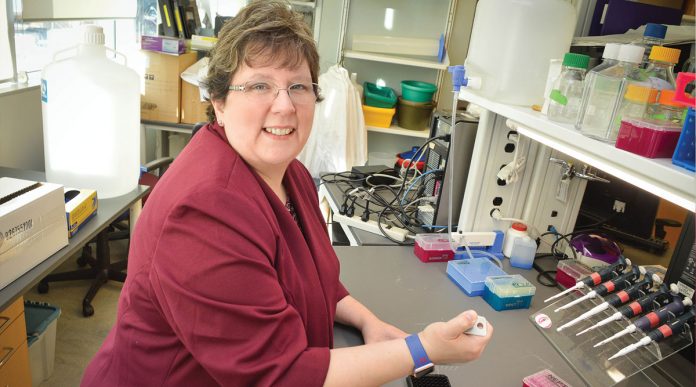New research from the Oklahoma Medical Research Foundation will help physicians better identify blood relatives of lupus patients at risk for developing the disease.
Lupus is caused by the immune system becoming unbalanced, leading to the development of autoantibodies and chronic inflammation that can damage the body’s tissues and organs. The disease predominantly strikes women and healthy relatives of lupus patients have an increased risk of developing the autoimmune disease compared to the general population.
In their recently published paper, OMRF scientists Judith James, M.D., Ph.D., and Melissa Munroe, M.D., Ph.D., evaluated previously unaffected relatives of lupus patients. Of the 409 lupus relatives who agreed to participate in the follow-up study, on average 6.5 years from their last evaluation for lupus, they found that 11 percent—45 people—had since developed lupus.
“We have been very curious about why some family members go on to become lupus patients themselves while others stay healthy,” said James. “We know that family members have some shared genetic risk, but we want to identify who is the most at-risk.”
James and Munroe found that higher levels of specific inflammatory proteins in the blood predicted which subjects would develop the disease. On the other hand, family members who did not develop lupus had higher-functioning regulatory mechanisms in place that may have been protective.
“Although many relatives transitioned into lupus patients, we had far more, 89 percent, who stayed healthy,” said Munroe. “This research focused on trying to find blood markers that identify people, even seven years beforehand, who are going to become lupus patients.”
Based on the results of this study, which were published in the scientific journal Arthritis & Rheumatology, James and Munroe recommend that physicians test the relatives of lupus patients for the specific inflammatory proteins in their blood. For those who display higher levels of the proteins, they suggest referring them to a rheumatologist for a consultation and possible enrollment in clinical trials focused on preventing disease onset.
James and Munroe will be partnering with other lupus researchers to launch one such prevention trial at OMRF. Known as SMILE, the clinical trial will seek to identify individuals found to be at high-risk for lupus and treat them with an anti-inflammatory medication. The goal of the upcoming prevention trial is to delay the onset of lupus, lessen the symptoms of the disease, or potentially prevent it altogether.
“This kind of work is really expansive and new,” said James. “It gives us hope that we can better identify early markers for the development of lupus, but maybe even more importantly, that we can learn from the immune systems of family members who don’t get sick. This might tell us how we could retrain the immune system to keep people healthy.”
A native of Pond Creek, Okla., James earned her M.D. and Ph.D. degrees from the University of Oklahoma Health Sciences Center and joined OMRF’s scientific staff in 1994. A pioneer in the field of autoimmune disease prediction and holder of the Lou C. Kerr Chair in Biomedical Research at OMRF, her work has advanced scientists’ understanding of lupus and helped physicians delay disease onset in patients displaying early symptoms of lupus.
Munroe joined OMRF in 2010 from the University of Iowa. Her research focuses on developing and testing novel strategies for monitoring autoimmune diseases with the goal of mitigating or preventing further organ damage caused by these diseases.
Other OMRF staff members who contributed to this project were Joel Guthridge, Ph.D., Virginia Roberts, Tiny Powe, Tim Gross, Wade DeJager, Rebecka Bourn, Ph.D., and Angela Andersen, Ph.D.
The study was supported by the National Institute of Allergy, Immunology and Infectious Diseases (grant numbers U01AI101934, R01AI024717, U19AI082714), the National Institute of General Medical Sciences (grants U54GM104938, P30GM103510), and the National Institute of Arthritis, Musculoskeletal and Skin Diseases (grants P30AR053483, RC1AR058554, and U34AR067392). All of these are parts of the National Institutes of Health.













